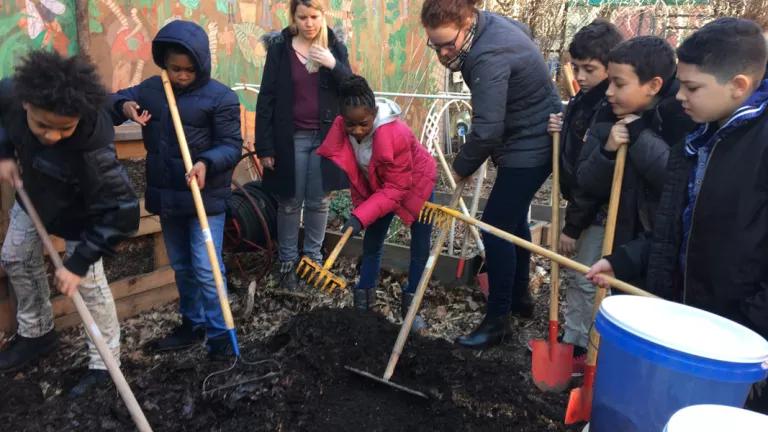NYC Must Enact a Universal Food Waste Composting Law, Part II
The time has arrived for the nation’s largest city to implement a universal, curbside organics collection program for all residents.

Council Speaker Adrienne Adams and Sanitation Chair Sandy Nurse can become environmental champions by helping to pass landmark composting legislation in 2022. What will they do?
Brandon Harrison/sandyforcouncil.com and New York City Council
The proposed cutbacks to expansion of New York City’s voluntary composting programs, which are included in Mayor Eric Adams’ preliminary budget, make one thing crystal clear:
The time has arrived for the nation’s largest city to implement a universal, curbside organics collection program for all residents.
Such a program is needed to slash the amount of trash the city exports to environmentally troublesome landfills and incinerators, cut climate-altering methane emissions, and take a bite out of the city’s rat population.
Adoption of universal composting collections would mark the most significant change to residential waste policy in New York City since the phase-in of curbside recycling pick-ups more than three decades ago.
In part I of this blog, we described in more detail the reasons why this approach makes sense and the long-stalled promises of government officials to bring composting collection services to every city household.
Here in part II, we outline key provisions that should be included in City Council legislation designed to phase-in mandatory curbside composting collections citywide by 2027.
Specifically, we urge the City Council and Mayor Eric Adams to enact legislation that spells out a step-by-step, year-by-year composting agenda, to be implemented in cooperation with Sanitation Department leadership.
2022
The statute should direct the Sanitation Department to spend the first year after enactment producing a study of what went right and what went wrong with the city’s previous pilot curbside composting programs and what lessons NYC can learn from successful mandatory curbside composting programs in other jurisdictions. Among the topics the Department should analyze:
- Have New Yorkers been getting enough information about why curbside composting is important and how to participate?
- How has the frequency of organics pick-ups affected collection rates?
- Should the existing curbside brown bin containers be redesigned to ensure that they are 100% rat- and racoon-proof?
- How have other cities maximized the cost-effectiveness of their mandatory curbside composting collection programs?
- Does New York have sufficient capacity to compost the expected increase in collected food scraps and yard waste as the program expands over time, and what are the options for boosting such capacity, both within city limits and throughout the region?
2023
In year two, the statute should require the Department to prepare a comprehensive plan for how its universal curbside organics collection program will be designed and implemented. The plan should be based upon lessons learned from the Department’s year one study and experiences of other jurisdictions that have successfully implemented mandatory curbside composting programs. Among other things, the plan should:
- Outline a program for phasing in separated food scrap and yard waste collections over years three, four and five that provides for least weekly curbside collections at every city residence (and that prohibits the disposing of food scraps or yard waste with ordinary trash).
- Require separated food waste collections at every city elementary school, high school and college.
- Spell out a strategy to ensure successful curbside composting collection services for New York City Housing Authority residents.
- Include a major, multi-language public education component.
- Propose adjustments that are needed or advisable for Sanitation Department collection schedules, work rules, etc.
- Describe how community organics collections and local compost processing operations successfully being run by city non-profits, GrowNYC and the botanical gardens can be integrated into the city’s universal composting plan and other NYC sustainability programs.

San Francisco has been running a successful curbside food scrap composting collection program, supported by a consistent public education effort with multilingual outreach materials, for more than a decade.
Justin Sullivan/Getty
2024
In year three, the statute should specify that the new composting program be phased in -- following a six-month voluntary period -- with mandatory organics separation and collection beginning in at least two Sanitation districts in each borough. This gradual start-up would give the Department the opportunity to test the new program’s design in the real world, work out any kinks, and make adjustments before expanding the program more broadly. An extensive, multi-media public education effort should commence three months before the first collections start and should continue for the duration of the three-year phase in period.
2025 and 2026
In year four, the Department should be charged with rolling out the curbside collection program in at least half of the Sanitation Districts in each borough. And in year five, the Department should expand food waste collections to blanket the remaining districts, so that by the end of that year, every city household would be served by curbside composting pick-ups.
***
City Hall budget chieftains, in defending their just-proposed cutbacks to the voluntary curbside composting program, claim that the pilot project, as currently operated, is not cost-effective. But this curbside pilot project, which has suffered from frequent starts, stops and changes over the years, has never received wholehearted governmental support.
Mayor Eric Adams and Council Speaker Adrienne Adams understand the urgency of the climate crisis and are committed to improving the quality-of-life for all New Yorkers. They can demonstrate their environmental leadership by advancing sweeping new legislation that phases in curbside composting collections over the next five years to serve every city household.




